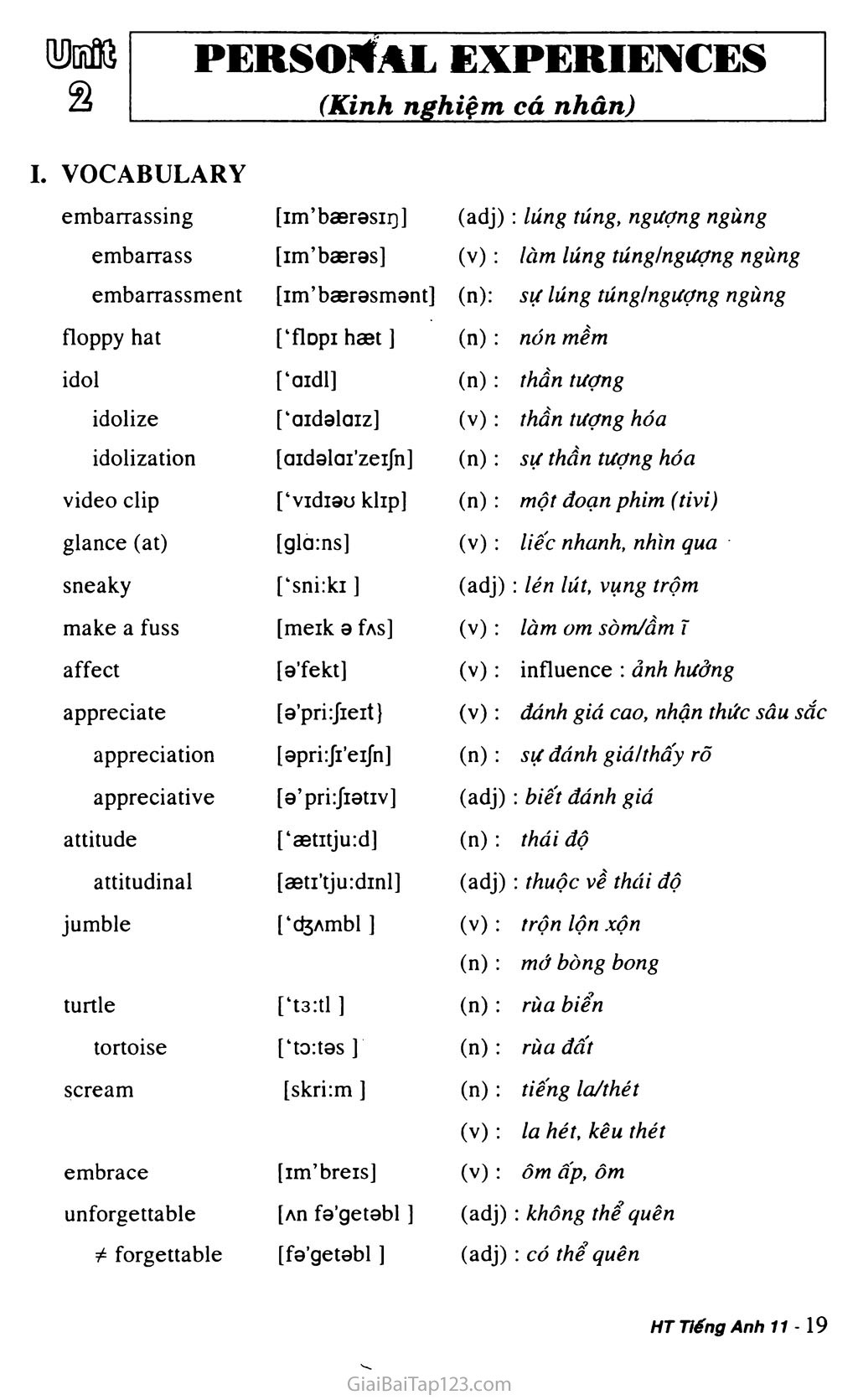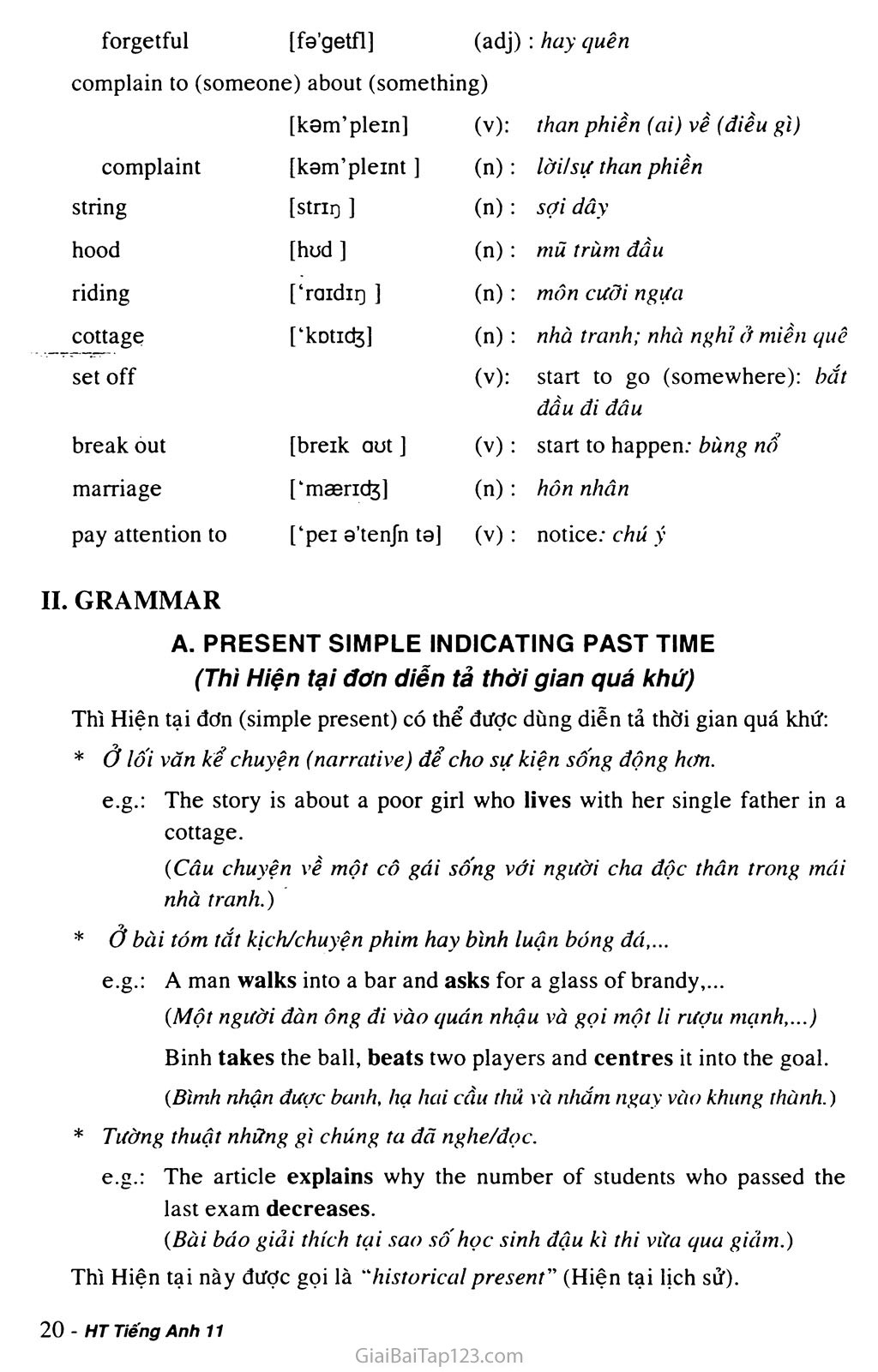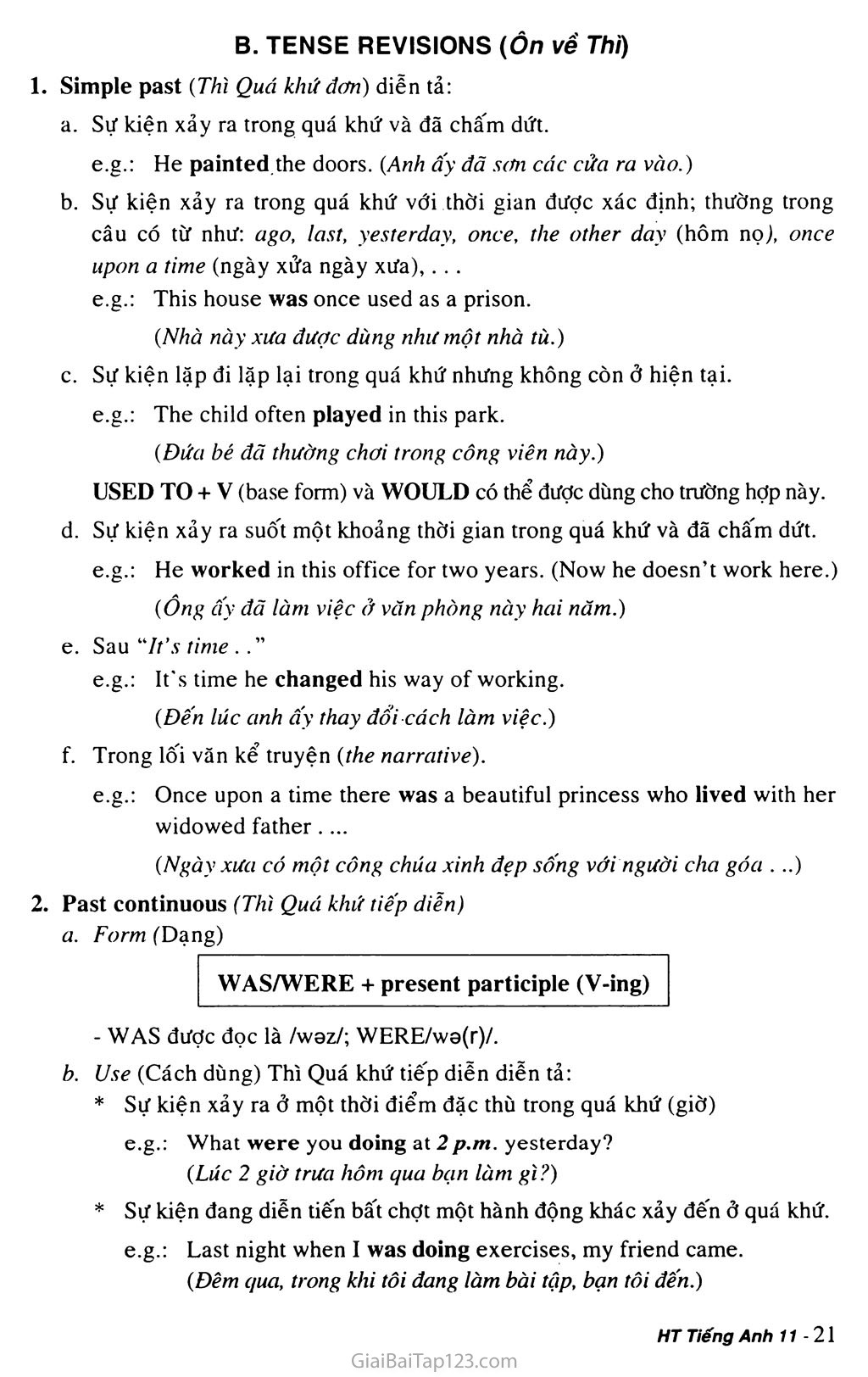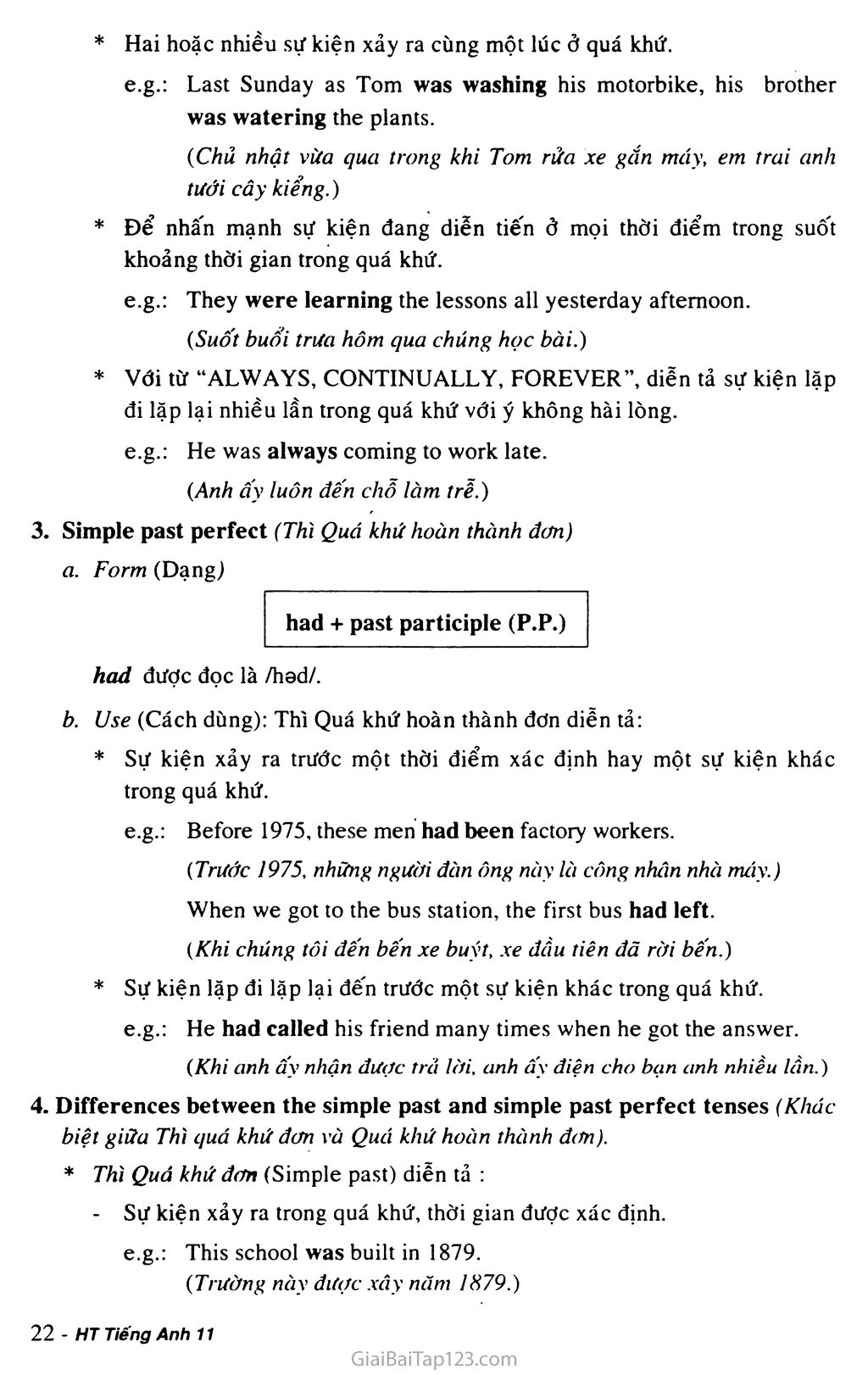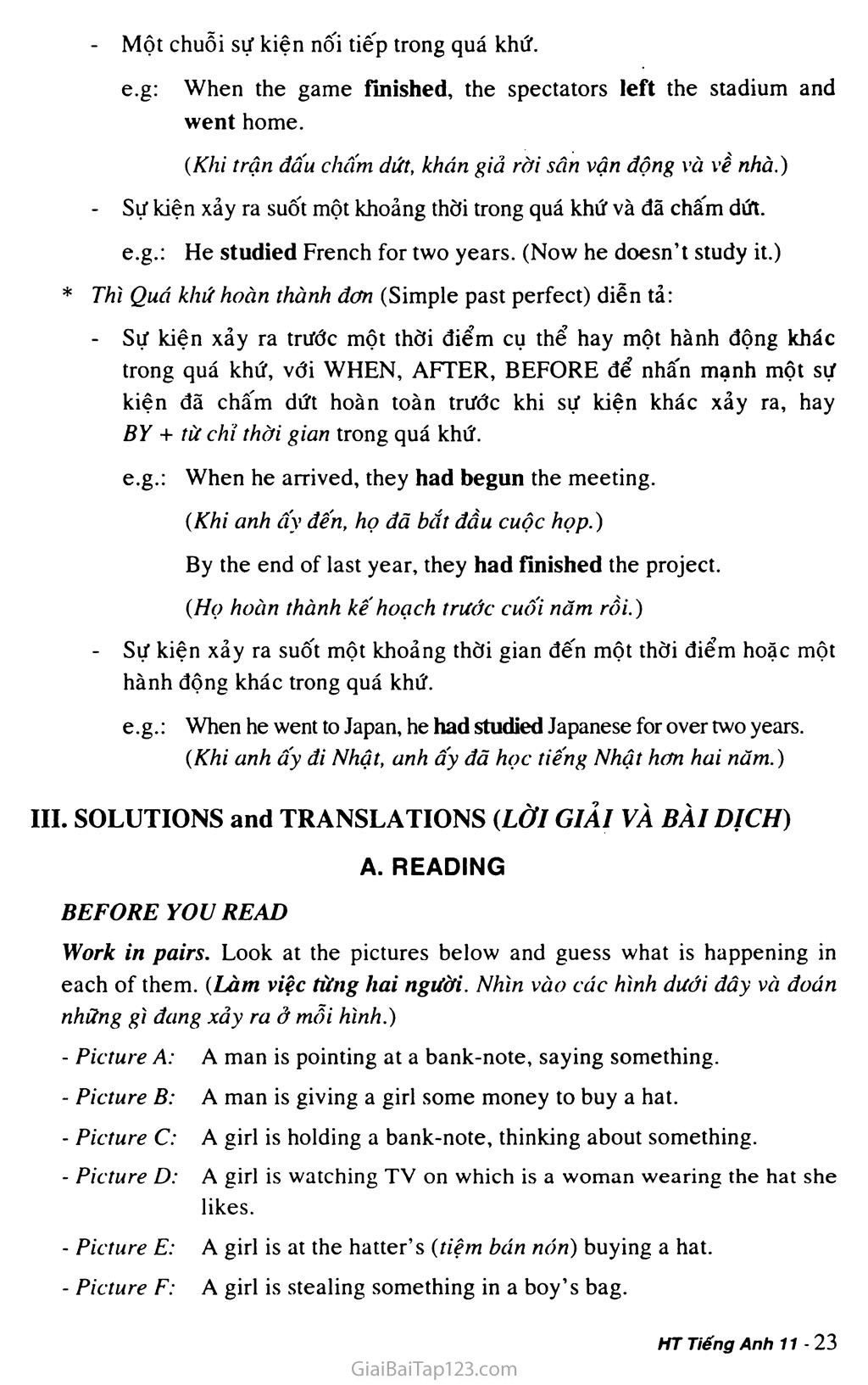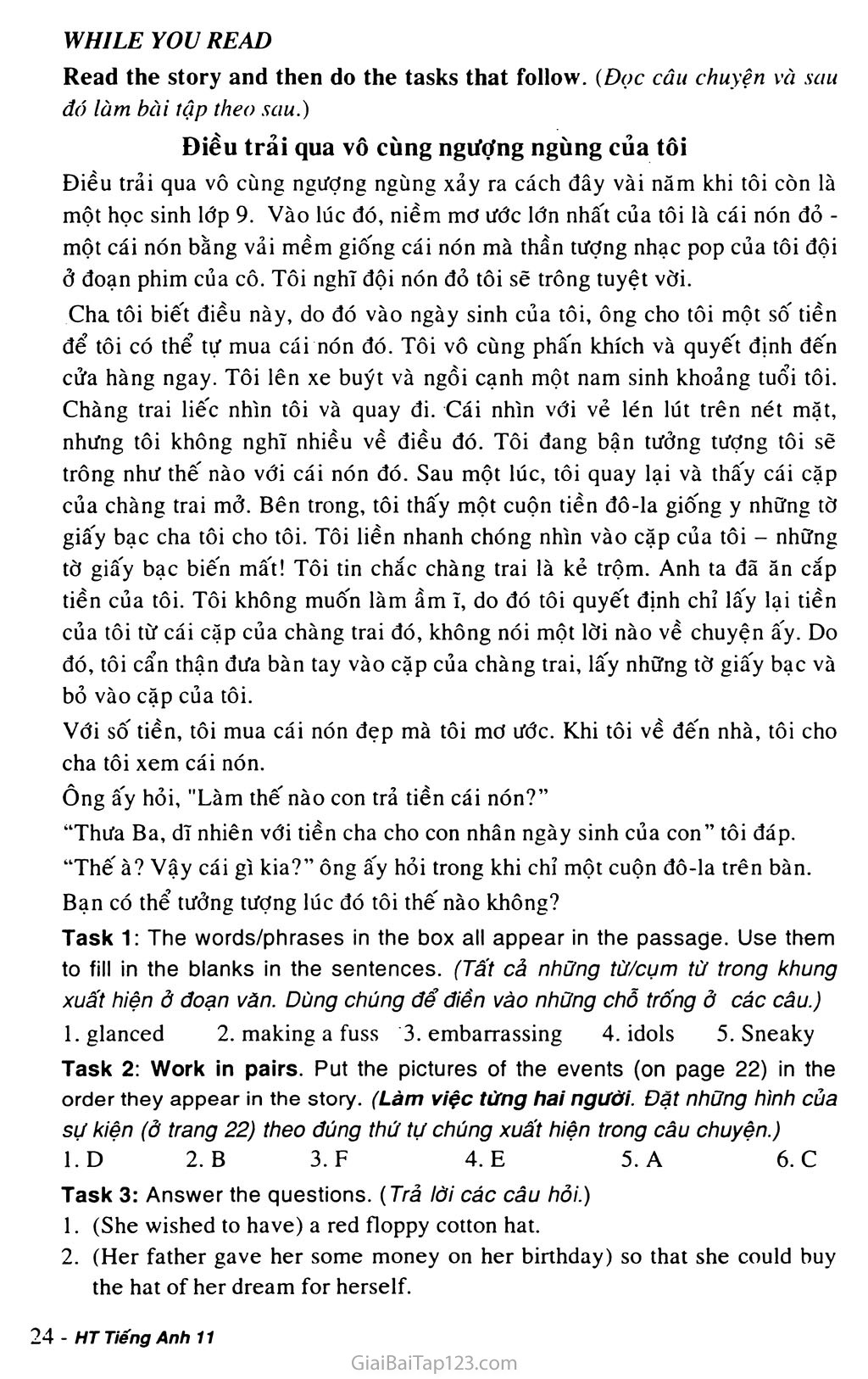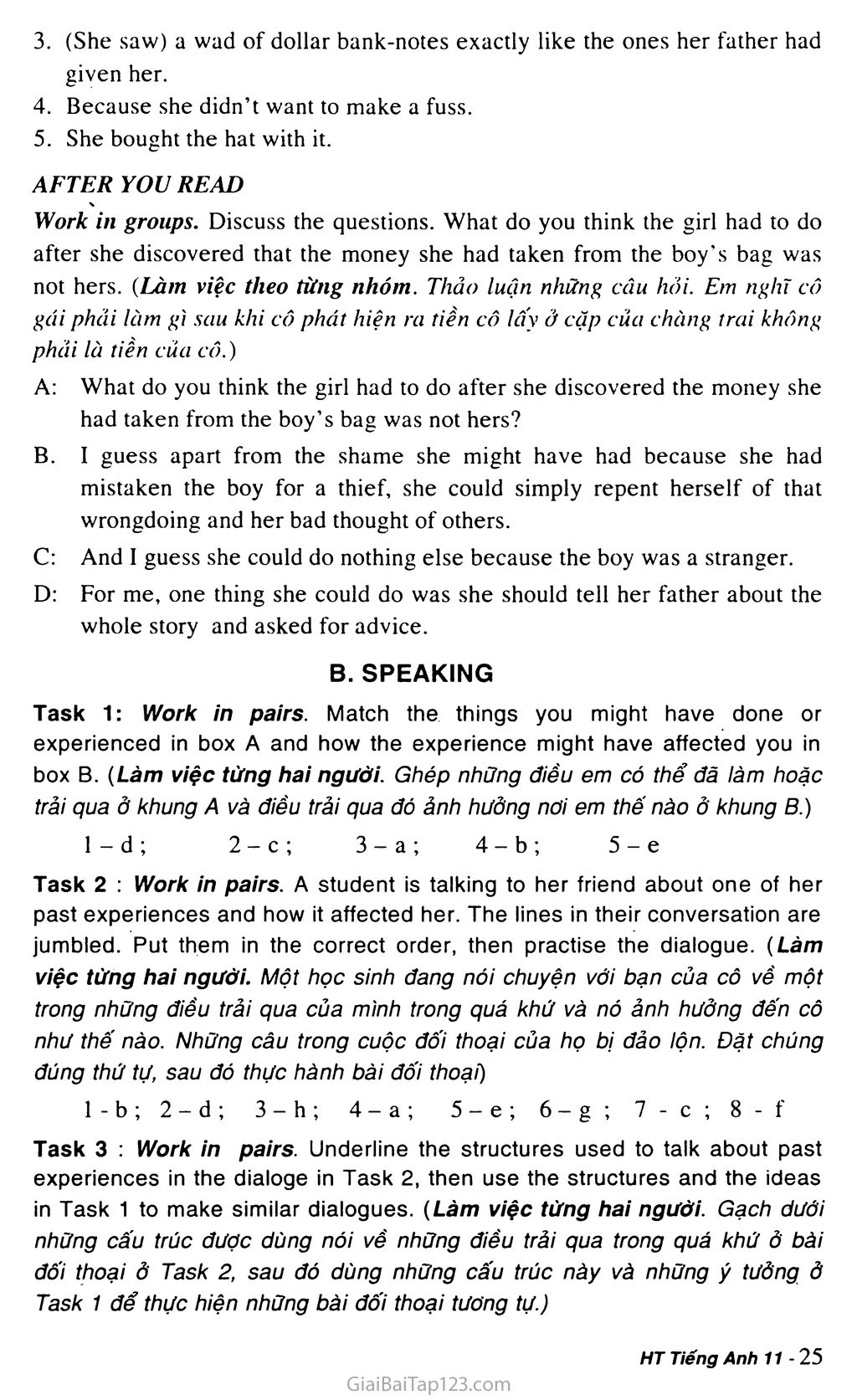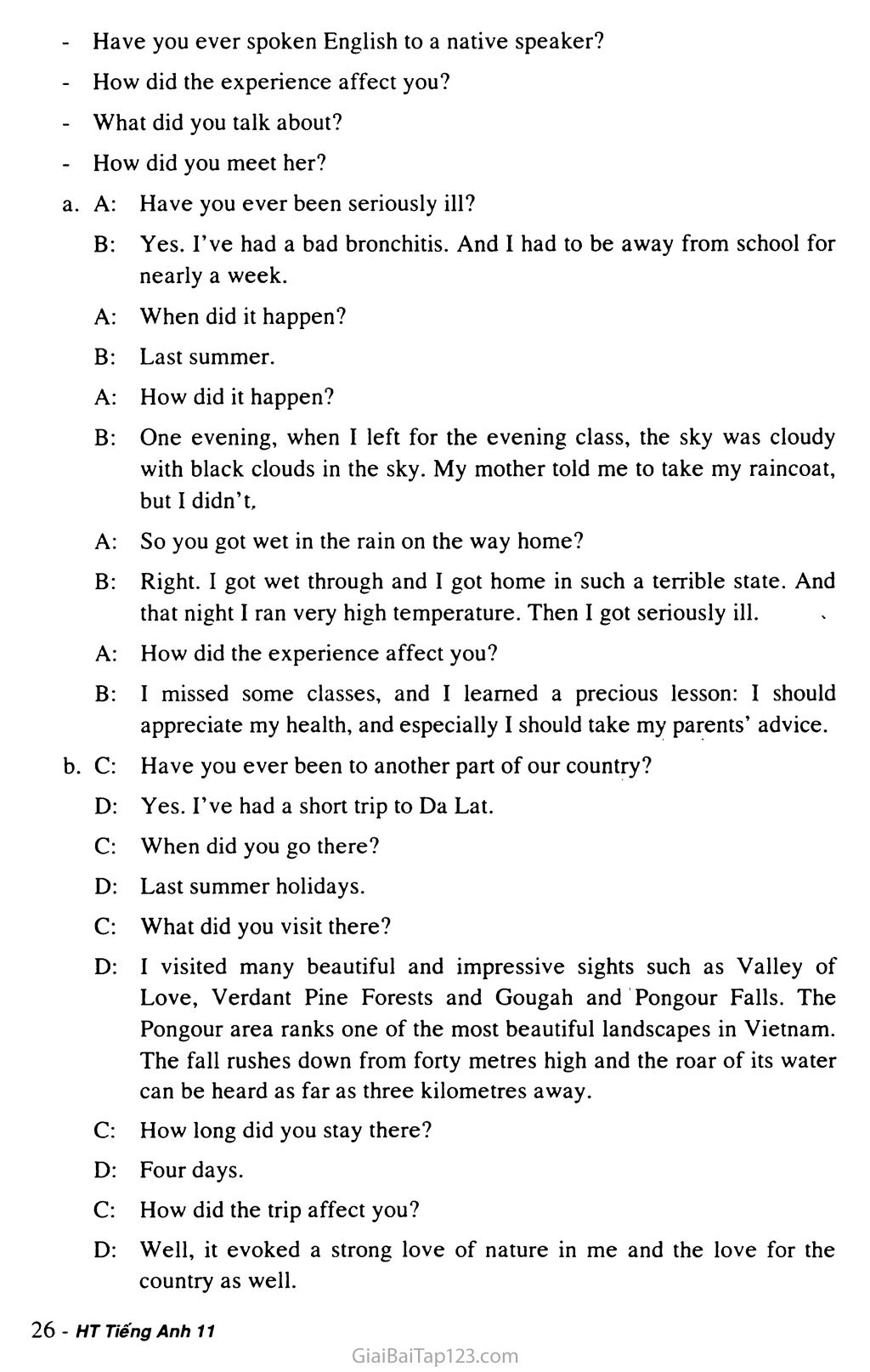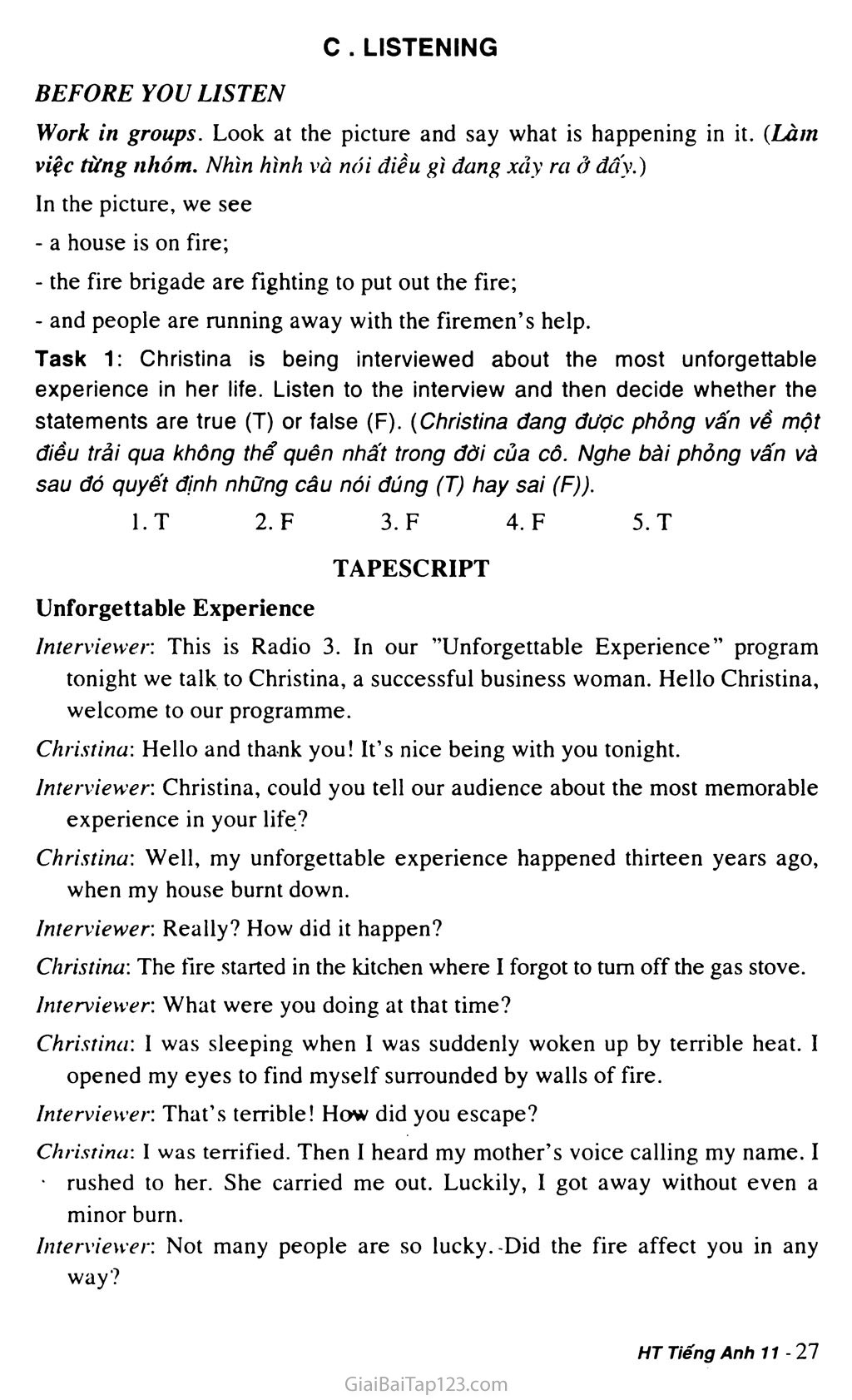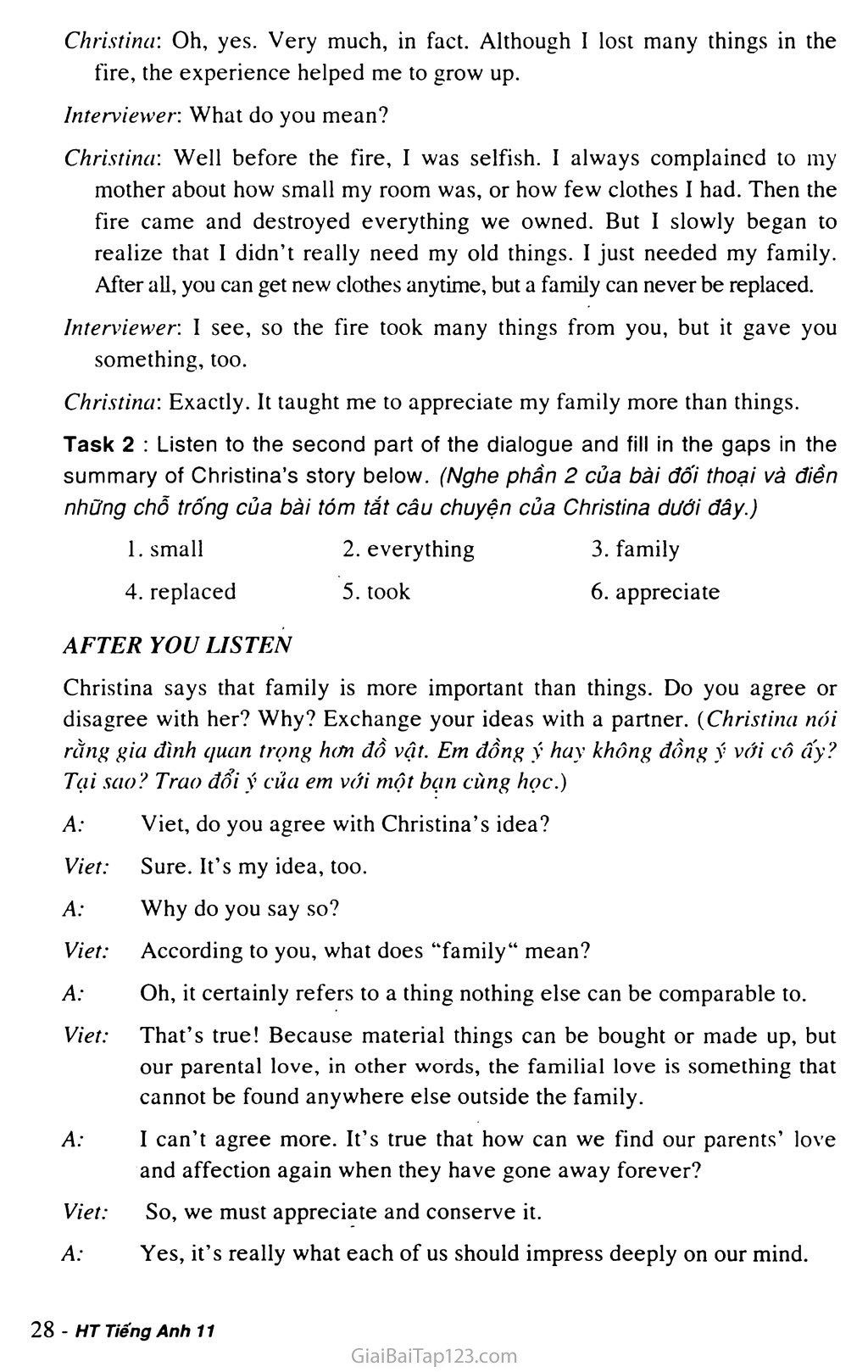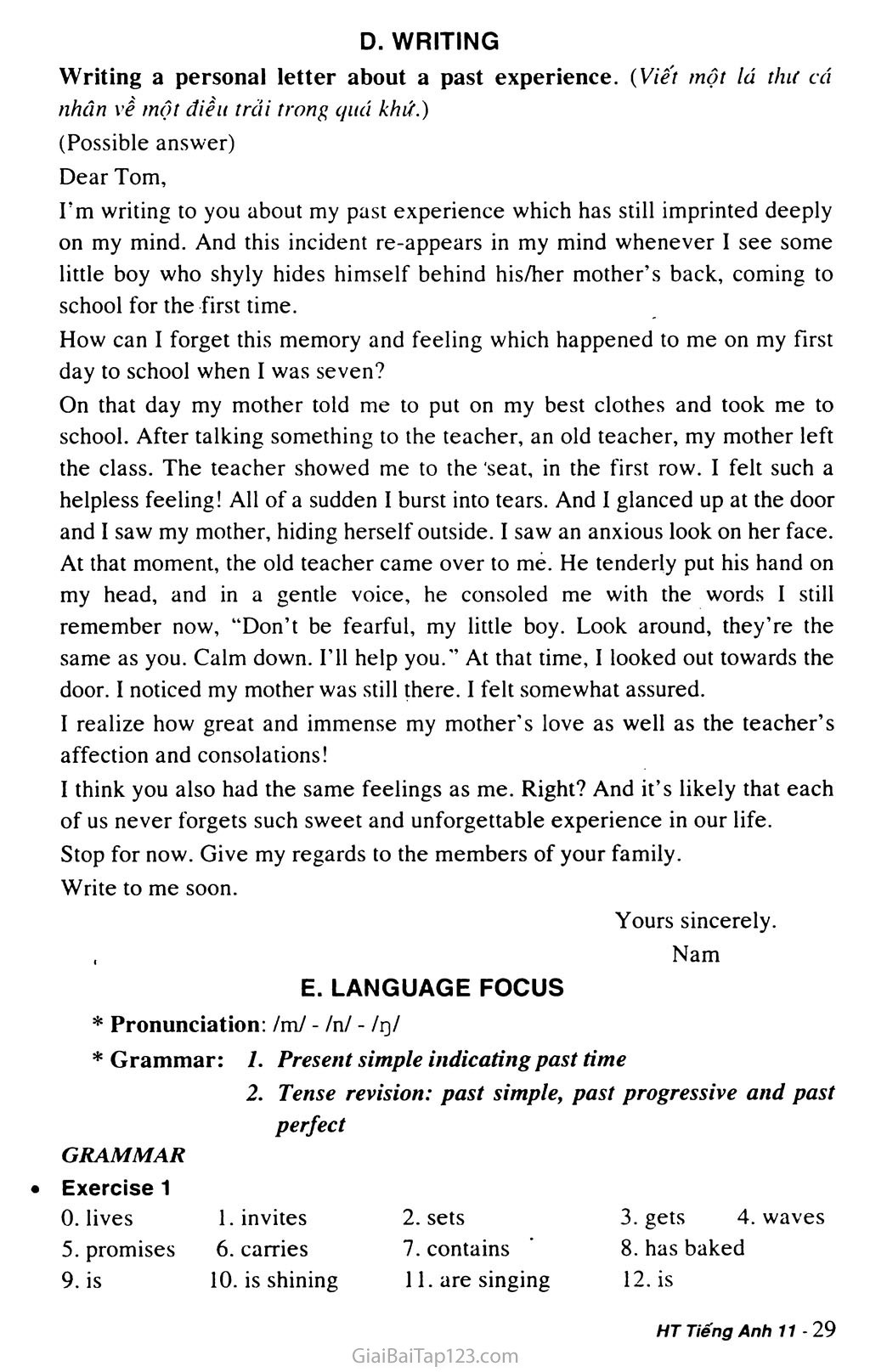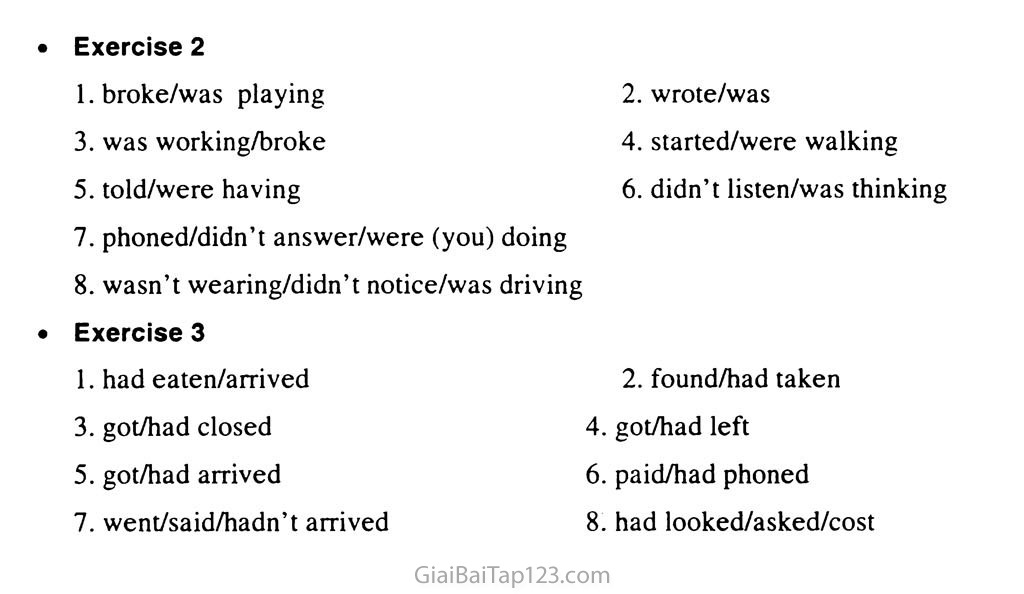Giải tiếng Anh lớp 11 Unit 2: PERSONAL EXPERIENCES
Mỉ
g
PERSONAL EXPERIENCES
(Kỉnh nghiệm cả nhăn)
VOCABULARY
embarrassing
[im’baerasiq]
(adj)
: lúng túng, ngượng ngùng
embarrass
[im’baeras]
(V):
làm lúng túng/ngượng ngùng
embarrassment
[im’baerasmant]
(n):
sự lúng túng/ngượng ngùng
floppy hat
[‘flDpi hast ]
(n) :
nón mềm
idol
[‘aidl]
(n):
thần tượng
idolize
[‘aidalaiz]
(V):
thần tượng hóa
idolization
[aidalai’zeijn]
(n):
sự thần tượng hóa
video clip
[‘vidiao klip]
(n) :
một đoạn phim (tivi)
glance (at)
[gla:ns]
(V):
liếc nhanh, nhìn qua
sneaky
[‘sni:ki ]
(adj)
: lén lút, vụng trộm
make a fuss
[meik 9 fAs]
(V):
làm om sòm/ầm ĩ
affect
[a’fekt]
(V):
influence : ảnh hưởng
appreciate
[a’prijieit]
(V):
đánh giá cao, nhận thức sâu sắc
appreciation
[apriji’eijn]
(n) :
sự đánh giá/thấy rõ
appreciative
[a’prijiativ]
(adj)
: biết đánh giá
attitude
[*aetitju:d]
(n):
thái độ
attitudinal
[aeti’tju:dinl]
(adj)
: thuộc về thái độ
jumble
[‘djAmbl ]
(V):
trộn lộn xộn
(n) :
mớ bòng bong
turtle
[‘t3:tl ]
(n):
rùa biển
tortoise
[‘to:tas ]
(n) :
rùa đất
scream
[skri:m ]
(n):
tiếng la/thét
(V):
la hét, kêu thét
embrace
[im’breis]
(V):
ôm ấp, ôm
unforgettable
[An fa’getabl ]
(adj)
: không thể quên
forgettable
[fa’getabl ]
(adj)
: có thể quên
forgetful [fs’getfl] (adj) : hay quên
complain to (someone) about (something)
[ksm’plein]
(V):
than phiền (ai) về (điều gì)
complaint
[kam’pleint ]
(n) :
lời/sự than phiền
string
[striq ]
(n) :
sợi dây
hood
[hud ]
(n) :
mũ trùm đầu
riding
[‘raidiq ]
(n) :
môn cưỡi ngựa
cottage
[‘kDtidsl
(n):
nhà tranh; nhà nghi ở miền quê
set off
(V):
start to go (somewhere): bắt đầu đi đâu
break out
[breik aut ]
(V):
start to happen; bùng nổ
marriage
[‘maeridsl
(n):
hôn nhân
pay attention to
[‘pel a’tenfn ta]
(V):
notice; chú ý
II. GRAMMAR
A. PRESENT SIMPLE INDICATING PAST TIME
(Thì Hiện tại đơn diễn tả thời gian quá khứ)
Thì Hiện tại đơn (simple present) có thể được dùng diễn tả thời gian quá khứ:
Ớ lô'i văn kể chuyện (narrative) để cho sự kiện sống động hơn.
e.g.: The story is about a poor girl who lives with her single father in a cottage.
(Câu chuyện về một cô gái sông với người cha độc thân trong mái nhà tranh.)
Ở bài tóm tắt kịch/chuyện phim hay bình luận bóng đá,... e.g.: A man walks into a bar and asks for a glass of brandy,...
(Một người đàn ông đi vào quán nhậu và gọi một li rượu mạnh,...) Binh takes the ball, beats two players and centres it into the goal. (Bìmh nhận được banh, hạ hai cầu thủ là nhắm ngay vào khung thành.)
Tường thuật những gì chúng ta đã nghe/đọc.
e.g.: The article explains why the number of students who passed the last exam decreases.
(Bài báo giải thích tại sao số học sinh đậu kì thi vừa qua giâm.)
Thì Hiện tại này được gọi là “historicalpresent" (Hiện tại lịch sử).
B. TENSE REVISIONS (Ôn vê' Thì)
Simple past (Thì Quá klĩứ đơn) diễn tả:
Sự kiện xảy ra trong quá khứ và đã châm dứt.
e.g.: He painted the doors. (Anh ấy đã sơn các cửa ra vào.)
Sự kiện xảy ra trong quá khứ với thời gian được xác định; thường trong câu có từ như: ago, last, yesterday, once, the other day (hôm nọ), once upon a time (ngày xửa ngày xưa),. . .
e.g.: This house was once used as a prison.
(Nhà này xưa được dùng như một nhà tù.)
Sự kiện lặp đi lặp lại trong quá khứ nhưng không còn ở hiện tại. e.g.: The child often played in this park.
(Đứa bé đã thường chơi trong công viên này.)
USED TO + V (base form) và WOULD có thể được dùng cho trường hợp này.
Sự kiện xảy ra suôi một khoảng thời gian trong quá khứ và đã châm dứt.
g.: He worked in this office for two years. (Now he doesn’t work here.)
(Ong ấy đã làm việc ở văn phòng này hai năm.)
Sau “If s time ..”
e.g.: It's time he changed his way of working.
(Đến lúc anh ấy thay đổi-cách làm việc.)
Trong lôi văn kể truyện (the narrative).
e.g.: Once upon a time there was a beautiful princess who lived with her widowed father ....
(Ngày xưa có một công chúa xinh dẹp sống với người cha góa . ..)
Past continuous (Thì Quá khứ tiếp diễn)
Form (Dạng)
WASZWERE + present participle (V-ing)
- WAS được đọc là /woz/; WERE/wo(r)/.
Use (Cách dùng) Thì Quá khứ tiếp diễn diễn tả:
Sự kiện xảy ra ở một thời điểm đặc thù trong quá khứ (giờ) e.g.: What were you doing at 2p.m. yesterday?
(Lúc 2 giờ trưa hôm qua bạn lùm gì?)
Sự kiện đang diễn tiến bất chợt một hành động khác xảy đến ở quá khứ.
e.g.: Last night when I was doing exercises, my friend came.
(Đêm qua, trong khi tôi đang làm bài tập, bạn tỏi đến.)
Hai hoặc nhiều sự kiện xảy ra cùng một lúc ở quá khứ.
e.g.: Last Sunday as Tom was washing his motorbike, his brother was watering the plants.
(Chủ nhật vừa qua trong khi Tom rửa xe gắn máy, em trai anh tưới cây kiểng.)
Để nhân mạnh sự kiện đang diễn tiến ở mọi thời điểm trong suốt khoảng thời gian trong quá khứ.
e.g.: They were learning the lessons all yesterday afternoon.
(Suo't buổi trưa hôm qua chúng học bài.}
Với từ “ALWAYS, CONTINUALLY, FOREVER”, diễn tả sự kiện lặp đi lặp lại nhiều lần trong quá khứ với ý không hài lòng.
e.g.: He was always coming to work late.
(Anh ấy luôn đến chỗ làm trễ.)
Simple past perfect (Thì Quá khứ hoàn thành đơn)
Form (Dạng)
had + past participle (P.P.)
had được đọc là /had/.
Use (Cách dùng): Thì Quá khứ hoàn thành đơn diễn tả:
Sự kiện xảy ra trước một thời điểm xác định hay một sự kiện khác trong quá khứ.
e.g.: Before 1975, these men had been factory workers.
(Trước 1975, những người đàn ông này là công nhân nhà máy.) When we got to the bus station, the first bus had left.
(Khi chúng tôi đến bến xe buýt, xe dầu tiên đã rời bến.)
Sự kiện lặp đi lặp lại đến trước một sự kiện khác trong quá khứ. e.g.: He had called his friend many times when he got the answer.
(Khi anh ấy nhận được trả lời, anh ấy điện cho bạn anh nhiều lần.)
Differences between the simple past and simple past perfect tenses (Khác biệt giữa Thì quá khứ đơn vù Quá khứ hoàn thành đơn).
* Thì Quá khứ đơn (Simple past) diễn tả :
- Sự kiện xảy ra trong quá khứ, thời gian được xác định.
e.g.: This school was built in 1879.
(Trường này được xây năm 1879.)
Một chuỗi sự kiện nối tiếp trong quá khứ.
e.g: When the game finished, the spectators left the stadium and went home.
(Khi trận đấu chấm dứt, khán giả rời sân vận động và về nhà.)
Sự kiện xảy ra suốt một khoảng thời trong quá khứ và đã chấm dứt. e.g.: He studied French for two years. (Now he doesn’t study it.)
* Thì Quá khứ hoàn thành đơn (Simple past perfect) diễn tả:
Sự kiện xảy ra trước một thời điểm cụ thể hay một hành động khác trong quá khứ, với WHEN, AFTER, BEFORE để nhấn mạnh một sự kiện đã châm dứt hoàn toàn trước khi sự kiện khác xảy ra, hay BY + từ chỉ thời gian trong quá khứ.
e.g.: When he arrived, they had begun the meeting.
(Khi anh ấy đến, họ đã bắt đầu cuộc họp.)
By the end of last year, they had finished the project.
(Họ hoàn thành kế hoạch trước cuối năm rồi.)
Sự kiện xảy ra suốt một khoảng thời gian đến một thời điểm hoặc một hành động khác trong quá khứ.
e.g.: When he went to Japan, he had studied Japanese for over two years. (Khi anh ấy đi Nhật, anh ấy đã học tiếng Nhật hơn hai năm.)
III. SOLUTIONS and TRANSLATIONS (LỜI GIẢI VÀ BÀI DỊCH)
A. READING
BEFORE YOU READ
Work in pairs. Look at the pictures below and guess what is happening in each of them. (Làm việc từng hai người. Nhìn vào các hình dưới đây và đoán những gì dang xây ra ở mỗi hình.)
Picture A: A man is pointing at a bank-note, saying something.
Picture B: A man is giving a girl some money to buy a hat.
Picture C: A girl is holding a bank-note, thinking about something.
Picture D: A girl is watching TV on which is a woman wearing the hat she
likes.
Picture E: A girl is at the hatter’s (tiệm bán nón) buying a hat.
Picture F: A girl is stealing something in a boy’s bag.
WHILE YOU READ
Read the story and then do the tasks that follow. (Đọc câu chuyện và sau đó làm bài tập theo sau.)
Điều trải qua vô cùng ngượng ngùng của tôi
Điều trải qua vô cùng ngượng ngùng xảy ra cách đây vài năm khi tôi còn là một học sinh lớp 9. Vào lúc đó, niềm mơ ước lớn nhất của tôi là cái nón đỏ - một cái nón bằng vải mềm giông cái nón mà thần tượng nhạc pop của tôi đội ở đoạn phim của cô. Tôi nghĩ đội nón đỏ tôi sẽ trông tuyệt vời.
Cha tôi biết điều này, do đó vào ngày sinh của tôi, ông cho tôi một sô' tiền để tôi có thể tự mua cái nón đó. Tôi vô cùng phân khích và quyết định đến cửa hàng ngay. Tôi lên xe buýt và ngồi cạnh một nam sinh khoảng tuổi tôi. Chàng trai liếc nhìn tôi và quay đi. Cái nhìn với vẻ lén lút trên nét mặt, nhưng tôi không nghĩ nhiều về điều đó. Tôi đang bận tưởng tượng tôi sẽ trông như thế nào với cái nón đó. Sau một lúc, tôi quay lại và thây cái cặp của chàng trai mở. Bên trong, tôi thây một cuộn tiền đô-la giông y những tờ giấy bạc cha tôi cho tôi. Tôi liền nhanh chóng nhìn vào cặp của tôi - những tờ giây bạc biến mâ't! Tôi tin chắc chàng trai là kẻ trộm. Anh ta đã ăn cắp tiền của tôi. Tôi không muô'n làm ầm ĩ, do đó tôi quyết định chỉ lâ'y lại tiền của tôi từ cái cặp của chàng trai đó, không nói một lời nào về chuyện â'y. Do đó, tôi cẩn thận đưa bàn tay vào cặp của chàng trai, lâ'y những tờ giây bạc và bỏ vào cặp của tôi.
Với số tiền, tôi mua cái nón đẹp mà tôi mơ ước. Khi tôi về đến nhà, tôi cho cha tôi xem cái nón.
Ông â'y hỏi, "Làm thế nào con trả tiền cái nón?”
“Thưa Ba, dĩ nhiên với tiền cha cho con nhân ngày sinh của con” tôi đáp. “Thế à? Vậy cái gì kia?” ông â'y hỏi trong khi chỉ một cuộn đô-la trên bàn. Bạn có thể tưởng tượng lúc đó tôi thế nào không?
Task 1: The words/phrases in the box all appear in the passage. Use them to fill in the blanks in the sentences. (Tất cả những từ/cụm từ trong khung xuất hiện ở đoạn văn. Dùng chúng để điền vào những chỗ trống ở các câu.)
1. glanced 2. making a fuss 3. embarrassing 4. idols 5. Sneaky Task 2: Work in pairs. Put the pictures of the events (on page 22) in the order they appear in the story. (Làm việc từng hai người. Đặt những hình của sự kiện (ở trang 22) theo đúng thứ tự chúng xuất hiện trong câu chuyện.) l.D 2. B 3. F 4. E 5?A 6. c
Task 3: Answer the questions. (Trả lời các câu hỏi.)
(She wished to have) a red floppy cotton hat.
(Her father gave her some money on her birthday) so that she could buy the hat of her dream for herself.
(She saw) a wad of dollar bank-notes exactly like the ones her father had given her.
Because she didn’t want to make a fuss.
She bought the hat with it.
AFTER YOU READ
Work in groups. Discuss the questions. What do you think the girl had to do after she discovered that the money she had taken from the boy’s bag was not hers. {Làm việc theo từng nhóm. Thảo luận những câu hỏi. Em nghĩ cô gái phải lùm gì sau khi cô phát hiện ra tiền cô lấy ở cặp của chàng trai không phãi là tiền cua cô.)
A: What do you think the girl had to do after she discovered the money she had taken from the boy’s bag was not hers?
B. I guess apart from the shame she might have had because she had mistaken the boy for a thief, she could simply repent herself of that wrongdoing and her bad thought of others.
C: And I guess she could do nothing else because the boy was a stranger.
D: For me, one thing she could do was she should tell her father about the
whole story and asked for advice.
B. SPEAKING
Task 1: Work in pairs. Match the things you might have done or experienced in box A and how the experience might have affected you in box B. {Làm việc từng hai người. Ghép những điều em có thể đã làm hoặc trải qua ở khung A và điều trải qua đó ảnh hưởng nơi em thế nào ở khung B.)
l-d; 2-c; 3-a; 4-b; 5-e
Task 2 : Work in pairs. A student is talking to her friend about one of her past experiences and how it affected her. The lines in their conversation are jumbled. Put them in the correct order, then practise the dialogue. {Làm việc từng hai người. Một học sinh đang nói chuyện với bạn của cô về một trong những điều trải qua của mình trong quá khứ và nó ảnh hưởng đến cô như thế nào. Những câu trong cuộc đối thoại của họ bị đảo lộn. Đặt chúng đúng thứ tự, sau đó thực hành bài đối thoại)
1-b; 2 -d ; 3 -h ; 4-a; 5 -e; 6-g; 7-c; 8 - f
Task 3 : Work in pairs. Underline the structures used to talk about past experiences in the dialoge in Task 2, then use the structures and the ideas in Task 1 to make similar dialogues. {Làm việc từng hai người. Gạch dưới những cấu trúc được dùng nói về những điều trải qua trong quá khứ ở bài đối thoại ở Task 2, sau đó dùng những cấu trúc này và những ý tưởng ở Task 1 dể thực hiện những bài đối thoại tương tự.)
Have you ever spoken English to a native speaker?
How did the experience affect you?
What did you talk about?
How did you meet her?
A: Have you ever been seriously ill?
B: Yes. I’ve had a bad bronchitis. And I had to be away from school for nearly a week.
A: When did it happen?
B: Last summer.
A: How did it happen?
B: One evening, when I left for the evening class, the sky was cloudy with black clouds in the sky. My mother told me to take my raincoat, but I didn’t,
A: So you got wet in the rain on the way home?
B: Right. I got wet through and I got home in such a terrible state. And that night I ran very high temperature. Then I got seriously ill.
A: How did the experience affect you?
B: I missed some classes, and I learned a precious lesson: I should appreciate my health, and especially I should take my parents’ advice.
C: Have you ever been to another part of our country?
D: Yes. I’ve had a short trip to Da Lat.
C: When did you go there?
D: Last summer holidays.
C: What did you visit there?
D: I visited many beautiful and impressive sights such as Valley of Love, Verdant Pine Forests and Gougah and Pongour Falls. The Pongour area ranks one of the most beautiful landscapes in Vietnam. The fall rushes down from forty metres high and the roar of its water can be heard as far as three kilometres away.
C: How long did you stay there?
D: Four days.
C: How did the trip affect you?
D: Well, it evoked a strong love of nature in me and the love for the country as well.
c . LISTENING
BEFORE YOU LISTEN
Work in groups. Look at the picture and say what is happening in it. {Lain việc từng nhóm. Nhìn hình và nói điều gì đang xảy ra ở đấy.)
In the picture, we see
a house is on fire;
the fire brigade are fighting to put out the fire;
and people are running away with the firemen’s help.
Task 1: Christina is being interviewed about the most unforgettable experience in her life. Listen to the interview and then decide whether the statements are true (T) or false (F). {Christina đang được phỏng vấn về một điều trải qua không thể quên nhất trong đời của cô. Nghe bài phỏng vấn và sau đó quyết định những câu nói dũng (T) hay sai (F)).
l.T 2.F 3.F 4.F 5. T
TAPESCRIPT
Unforgettable Experience
Interviewer This is Radio 3. In our ’’Unforgettable Experience” program tonight we talk to Christina, a successful business woman. Hello Christina, welcome to our programme.
Christina: Hello and thank you! It’s nice being with you tonight.
Interviewer: Christina, could you tell our audience about the most memorable experience in your life?
Christina: Well, my unforgettable experience happened thirteen years ago, when my house burnt down.
Interviewer: Really? How did it happen?
Christina: The fire started in the kitchen where I forgot to turn off the gas stove. Interviewer: What were you doing at that time?
Christina: I was sleeping when I was suddenly woken up by terrible heat. I opened my eyes to find myself surrounded by walls of fire.
Interviewer: That’s terrible! How did you escape?
Christina: I was terrified. Then I heard my mother’s voice calling my name. I rushed to her. She carried me out. Luckily, I got away without even a minor burn.
Interviewer: Not many people are so lucky. -Did the fire affect you in any way?
Christina: Oh, yes. Very much, in fact. Although 1 lost many things in the fire, the experience helped me to grow up.
Interviewer: What do you mean?
Christina: Well before the fire, I was selfish. I always complained to my mother about how small my room was, or how few clothes I had. Then the fire came and destroyed everything we owned. But I slowly began to realize that I didn’t really need my old things. I just needed my family. After all, you can get new clothes anytime, but a family can never be replaced.
Interviewer: I see, so the fire took many things from you, but it gave you something, too.
Christina: Exactly. It taught me to appreciate my family more than things.
Task 2 : Listen to the second part of the dialogue and fill in the gaps in the summary of Christina’s story below. (Nghe phần 2 của bài đối thoại và điền những chỗ trống của bài tóm tắt câu chuyện của Christina dưới đây.)
1. small 2. everything 3. family
replaced 5. took 6. appreciate
AFTER YOU LISTEN
Christina says that family is more important than things. Do you agree or disagree with her? Why? Exchange your ideas with a partner. (Christina nái rằng gia đình quan trọng hơn đồ vật. Em đồng ỷ hay không đồng ý với cô ấy? Tại sao? Trao đổi ý cửa em với một bạn cùng học.)
A: Viet, do you agree with Christina’s idea?
Viet: Sure. It’s my idea, too.
A: Why do you say so?
Viet: According to you, what does “family" mean?
A: Oh, it certainly refers to a thing nothing else can be comparable to.
Viet: That’s true! Because material things can be bought or made up, but our parental love, in other words, the familial love is something that cannot be found anywhere else outside the family.
A: I can’t agree more. It’s true that how can we find our parents’ love
and affection again when they have gone away forever?
Viet: So, we must appreciate and conserve it.
A: Yes, it's really what each of US should impress deeply on our mind.
D. WRITING
Writing a personal letter about a past experience. (Viết một lá thư cá nhân về một điền trãi trong quá khứ.)
(Possible answer)
Dear Tom,
I’m writing to you about my past experience which has still imprinted deeply on my mind. And this incident re-appears in my mind whenever I see some little boy who shyly hides himself behind his/her mother’s back, coming to school for the first time.
How can I forget this memory and feeling which happened to me on my first day to school when I was seven?
On that day my mother told me to put on my best clothes and took me to school. After talking something to the teacher, an old teacher, my mother left the class. The teacher showed me to the 'seat, in the first row. I felt such a helpless feeling! All of a sudden I burst into tears. And I glanced up at the door and I saw my mother, hiding herself outside. I saw an anxious look on her face. At that moment, the old teacher came over to me. He tenderly put his hand on my head, and in a gentle voice, he consoled me with the words I still remember now, “Don’t be fearful, my little boy. Look around, they’re the same as you. Calm down. I’ll help you.’’ At that time, I looked out towards the door. I noticed my mother was still there. I felt somewhat assured.
I realize how great and immense my mother's love as well as the teacher’s affection and consolations!
I think you also had the same feelings as me. Right? And it’s likely that each of us never forgets such sweet and unforgettable experience in our life.
Stop for now. Give my regards to the members of your family.
Write to me soon.
Yours sincerely.
, Nam
E. LANGUAGE FOCUS
Pronunciation: /m/ - /n/ - /p/
Grammar: 1. Present simple indicating past time
GRAMMAR
• Exercise 1
2. Tense revision: past simple, past progressive and past perfect
0. lives
I. invites
2. sets
3. gets 4. waves
5. promises
6. carries
7. contains
8. has baked
9. is
10. is shining
11. are singing
12. is
Exercise 2
2. wrote/was
4. started/were walking 6. didn’t listen/was thinking
2. found/had taken got/had left paid/had phoned had looked/asked/cost
broke/was playing
3. was working/broke
told/were having
phoned/didn’t answer/were (you) doing
wasn’t wearing/didn’t notice/was driving
Exercise 3
1. had eaten/arrived

